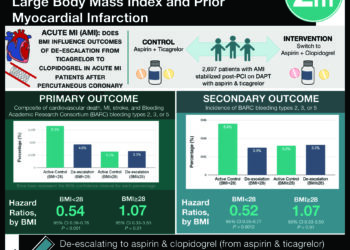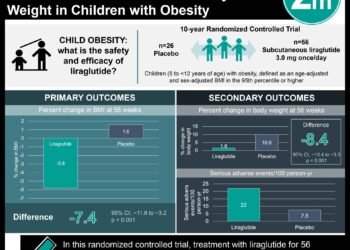Inter-pregnancy weight gains linked to increased risks of stillbirth and infant mortality
1. In this cohort study of Swedish population, women who gained at least 4 body-mass index (BMI) units between pregnancies had higher relative risks of stillbirth and infant mortality.
2. In overweight women with BMI greater than or equal to 25 kg/m2, weight loss before pregnancy was associated with reduced risk of neonatal mortality
Evidence Rating Level: 2 (Good)
Study Rundown: Despite improving access to perinatal care, rates of stillbirth remain tragically high in developed countries. There has been growing evidence linking maternal overweight status to increased stillbirth and infant mortality. However, weight gain between pregnancies is less well understood as a risk factor for stillbirth during subsequent pregnancies. In this cohort study based on Swedish population, researchers investigated whether changes in maternal BMI during early pregnancy from first to second pregnancies was associated with increased risks of stillbirth and infant mortality after the second pregnancy. Risk of stillbirth was found to increase linearly with increased BMI gain. Risk of infant mortality in second pregnancy increased with BMI gain only in women with healthy BMI during their first pregnancies. The investigators also noted that weight loss before pregnancy in overweight women reduced risk of neonatal. The cohort design is an inherent limitation that precludes establishing causal links. However, the statistical power is strong with information on nearly half a million women, which provides strong evidence of association between inter-pregnancy weight gains and subsequent stillbirth and infant mortality. The study results argue for the need of effective fiscal and public health strategies, with the goal of improving the awareness of healthy diets and physical activity in women of child bearing age.
The study was funded by Swedish Research Council for Health, Working Life and Welfare, and Karolinska Institutet.
Click to read the study in The Lancet
Relevant Reading: Maternal obesity and infant mortality: a meta-analysis
In-Depth [retrospective cohort]: This is a population-based cohort study of Swedish population. The investigators examined records from the Swedish Medical Birth Register for women whose first and second consecutive single births were recorded from January 1, 1992 to December 31, 2012. A total of 587710 women were included in the study, and complete information including early pregnancy BMI and other covariates was available for 456711 women. The primary outcomes included stillbirths (fetal death at 28 completed weeks or later), infant mortality (death during the first year of life in livebirths), neonatal mortality (death within 28 days of life) and postneonatal mortality (infant death after 28 days). For each outcome, relative risks were calculated using binomial regression.
The rate of stillbirth increased with interpregnancy weight gain in a linear fashion. The relative risk (RR) for stillbirth was 1.15 (95% CI, 0.97-1.35) for BMI changes between 1 and 2. RR increased to 1.38 (95% CI, 1.16-1.63) for BMI changes between 2 and 4, and further increased to 1.55 (95% CI, 1.23-1.96) for BMI changes greater than 4 units.
In women with healthy weight during first pregnancy (BMI <25 kg/m2), the risk of infant mortality also increased with weight gain. RR was 1.27 (95% CI 1.01-1.59) for gains between 2 and 4 BMI units, and 1.60 (95% CI 1.16-2.22) for gains greater than 4 BMI units. For overweight women, loss of more than 2 BMI units was associated with reduced neonatal mortality (RR 0.49, 95% CI, 0.27-0.88).
Image: PD
©2015 2 Minute Medicine, Inc. All rights reserved. No works may be reproduced without expressed written consent from 2 Minute Medicine, Inc. Inquire about licensing here. No article should be construed as medical advice and is not intended as such by the authors or by 2 Minute Medicine, Inc.





